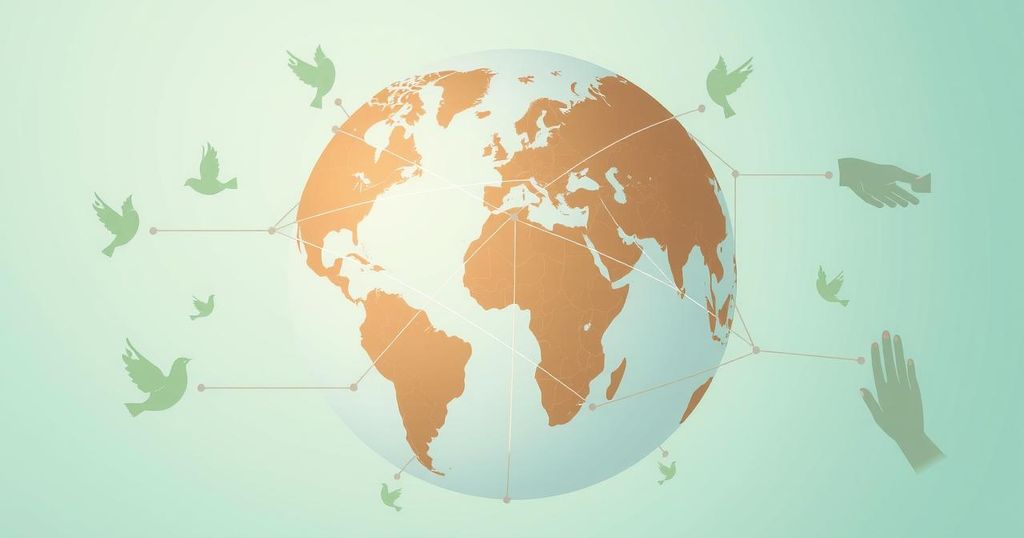World news
AFRICA, ANTISEMITISM, ASIA, BOULDER, BRAZIL, CHEZ MARIANNE, COLORADO, CONFLICT, DUJARRIC, EUROPE, FRANCE, GAZA, GAZA STRIP, GENEVA, GUTERRES, ILO, INTERNATIONAL LABOUR ORGANIZATION, ISRAEL, ISRAEL-PALESTINE CONFLICT, LE MUR DES JUSTES, NEW YORK, NORTH AMERICA, PALESTINE, PARIS, SHOAH MEMORIAL, SOUTH AMERICA, STEPHANE DUJARRIC, STÉPHANE DUJARRIC, SUDAN, SWITZERLAND, TERRORISM, UKRAINE, UN LABOUR AGENCY, UNITED STATES, WAR
Amira Khan
0 Comments
Guterres Condemns Antisemitic Attacks Amid Rising Global Tensions
UN Secretary-General António Guterres condemned antisemitic attacks following a violent incident in Boulder, Colorado, and vandalism in France. The ILO is meeting to discuss the risks of online work amid the gig economy’s growth. In Sudan, attacks continue against civilians, and cholera spreads. Ukraine faced deadly attacks on civilians just before renewed peace talks, with aid efforts underway.
In a recent statement, UN Secretary-General António Guterres condemned acts of antisemitism following a shocking attack in Boulder, Colorado. A man was arrested after allegedly using a flamethrower and Molotov cocktails during an event supporting Israeli hostages, injuring at least eight individuals. The suspect now faces multiple felonies, including federal hate crime charges. This incident occurred amidst a wave of antisemitic vandalism in France, specifically targeting Jewish landmarks.
Reports indicate that vandals defaced the Shoah Memorial and multiple synagogues in Paris, with images surfacing of green paint over the Le Mur Des Justes, commemorating those who aided Jews during World War II. No one has been apprehended for these actions, and no groups have claimed responsibility. UN Spokesperson Stéphane Dujarric reiterated Guterres’s condemnation, emphasizing the need for accountability and a firm stance against extremism.
Meanwhile, the International Labour Organization (ILO) is convening in Geneva for its annual conference, where discussions will address the risks and benefits of online work. With the rapid growth of digital platforms alongside the gig economy, the focus will be on finding ways to protect workers amid concerns over insufficient social safety measures. Senior ILO official Angelika Muller highlighted that many online workers find themselves within the informal economy, facing precarious conditions often dictated by algorithm-driven performance assessments.
The ILO aims to explore solutions for transitioning workers from the informal sector to formal employment while also tackling health risks associated with work exposure. This comes at a crucial time as the gig economy continues to expand, necessitating new protections for workers in the digital sphere.
In Sudan, the situation remains dire as attacks targeting civilians continue. On May 29, a facility of the World Food Programme was shelled, resulting in extensive damage, and a drone attack on Eldaman International Hospital claimed the lives of at least six health workers. These assaults, attributed to the Rapid Support Forces militia, demonstrate the ongoing violence as the conflict for power escalates.
Kristine Hambrouck, the acting humanitarian coordinator for Sudan, condemned the attacks as blatant violations of humanitarian law, urging all factions to safeguard civilian lives. Concurrently, UN relief chief Tom Fletcher expressed distress over the situation, calling for an immediate cessation of violence to protect civilians.
Additionally, cholera is spreading in Sudan amid worsening conditions. Strikes on power infrastructure in Khartoum have exacerbated water shortages, exposing over a million children to waterborne diseases. Despite these challenges, there has been a recorded decrease in new cholera cases thanks to local healthcare efforts. However, the outbreak remains a critical concern with over 16,500 cases reported so far.
In Ukraine, the UN reported significant civilian casualties from recent attacks, with over 20 deaths, including one child, and injuries to more than 100 individuals. Infrastructure has also suffered, placing heavy burdens on medical and educational facilities. Notably, these attacks occurred just prior to fresh peace talks between Ukrainian and Russian officials in Türkiye.
Humanitarian groups are mobilizing to deliver urgent aid, including food and medical supplies, to the hardest-hit areas. On May 30, an inter-agency convoy provided essential materials to over 700 residents in the frontline Mylivska community, helping them cope with the ongoing crisis and rebuilding efforts.
In summary, recent events underscore severe challenges, from antisemitic attacks in the U.S. and France to dire humanitarian crises in Sudan and Ukraine. Guterres’s condemnation of hate crimes emphasizes the UN’s commitment to fighting extremism. Concurrently, discussions at the ILO highlight the urgent need for protections within the expanding digital labor market. As humanitarian organizations respond to crises, the situation remains precarious, requiring international attention and intervention.
Original Source: news.un.org




Post Comment